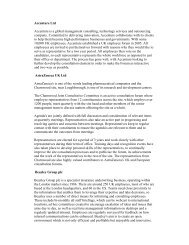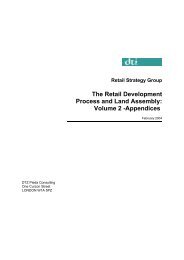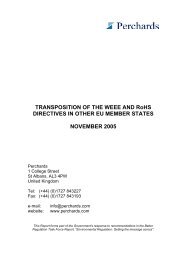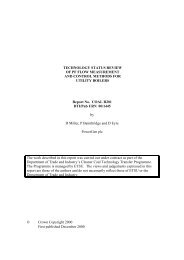Public Policy: Using Market-Based Approaches - Department for ...
Public Policy: Using Market-Based Approaches - Department for ...
Public Policy: Using Market-Based Approaches - Department for ...
Create successful ePaper yourself
Turn your PDF publications into a flip-book with our unique Google optimized e-Paper software.
<strong>Public</strong> <strong>Policy</strong>: <strong>Using</strong> <strong>Market</strong>-<strong>Based</strong> <strong>Approaches</strong><br />
Moreover, the fact that two prisons previously under private-sector management<br />
were lost to an in-house bid, indicates that the incumbency advantage is not<br />
absolute. An evaluation report by HMPS and the NAO report both concluded that<br />
these bids were won by the public sector on the basis of cost and quality, rather<br />
than as a result of discrimination. 91 Indeed, to the extent that the procurement<br />
process has encouraged the public sector to become more competitive,<br />
competition may even have been increasing over time.<br />
COLLUSION<br />
The nature of public procurement means it can be susceptible to collusion<br />
amongst bidders. Collusion is most likely to arise when many similar contracts are<br />
tendered at frequent intervals because this can allow bidders to allocate contracts<br />
between themselves. Requiring bidders to meet certain pre-selection criteria helps<br />
HMPS guarantee the quality of its suppliers but restricts the number of potential<br />
bidders and creates barriers to entry. These latter effects may increase the scope<br />
<strong>for</strong> collusion, as might the practice of publishing tender in<strong>for</strong>mation. As noted<br />
above, when in<strong>for</strong>mation regarding rivals’ bids is in the public domain it is much<br />
easier <strong>for</strong> colluding bidders to detect any deviation from their agreement. This<br />
increases the likelihood that defectors will be caught and subsequently punished,<br />
and so lowers the returns to cheating. Reducing the temptation to renege on an<br />
agreement in this way makes collusion easier to sustain.<br />
Controlling <strong>for</strong> collusion<br />
Although HMPS has not made any conscious ef<strong>for</strong>ts to try to prevent collusion<br />
in tenders <strong>for</strong> prison contracts, the way the process is run means that such<br />
collusion is unlikely. First, the use of a sealed bid auction design reduces price<br />
transparency, making it more difficult to detect and punish any member cheating<br />
on the agreement. As collusive agreements require an effective punishment<br />
mechanism to be sustainable, this has the effect of making coordination more<br />
difficult. Second, the number of contracts is few – just 21 in total since 1991. This<br />
has reduced the potential <strong>for</strong> collusion in two ways. First, as each contract is very<br />
valuable, it is always tempting <strong>for</strong> firms to cheat on any collusive agreement to<br />
secure the contract. Second, as there have been few of these contracts put to<br />
tender there have been limited opportunities <strong>for</strong> interaction amongst the<br />
competing firms. Because collusion is easier to sustain where rivals interact<br />
frequently, this naturally limits the scope <strong>for</strong> collusion. 92<br />
The allocation of public sector funding in the UK is such that plans can only ever<br />
be made three years in advance at most. This limits the extent to which collusion<br />
can be sustained by introducing a large amount of uncertainty into the future<br />
demand <strong>for</strong> private prison services. However, the overall effect of this practice<br />
91 A level playing field is ensured whenever an in-house team puts <strong>for</strong>ward a bid by adding the costs of their bid to<br />
the proposed contract, as well as an allowance <strong>for</strong> public sector overheads and differences in pension service<br />
provision.<br />
92 For example, two firms competing <strong>for</strong> twenty-one contracts may allow <strong>for</strong> collusion whereas twenty firms<br />
competing <strong>for</strong> the same number of contracts is unlikely to do so.<br />
92
















